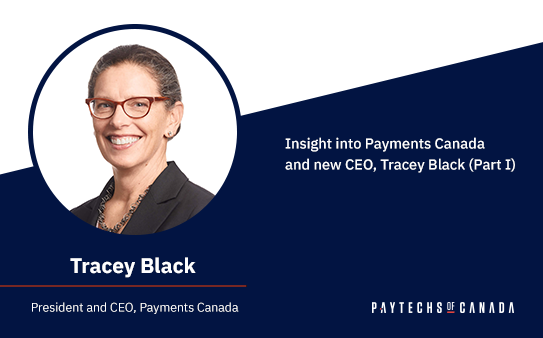By Doug Kreviazuk, Executive Director, Fintechs Canada.
Introduction:
Recently, I had the opportunity to pose a series of questions to the new CEO for Payments Canada, Tracey Black. In Part I of a two-part interview, Tracey discusses the strategic priorities for Payments Canada, the modernization efforts and the Retail Payments Oversight Framework. In Part II of the series, she comments on the effects of the pandemic, the case for broadened access to the system and Canada’s move toward an open banking framework.
PART II:
Q: As we have been in the midst of a pandemic that has disrupted much of the economy, what important lessons learned for the payments system have you drawn from the current situation?
Tracey: This has been an interesting time for all payments ecosystem participants, including Payments Canada. As always, our priority remains the safe, sound and efficient operation of Canada’s payment systems. As you might imagine with all the government programs that have been introduced to support Canadians through the pandemic, we have seen very high values – more than double or usual values – settling through our high-value system, LVTS. We also experienced a dramatic reduction in volumes and values in our retail batch system, ACSS, as Canadians self-isolated in March through June. Throughout the pandemic, our systems have been resilient and have operated as expected.
As an industry, we have shifted our focus to digital payments in order to better meet end-user needs. While we have seen a continued shift towards digital payments over a number of years in Canada, there’s no doubt that the prevailing pandemic has accelerated this shift. Payments Canada surveyed Canadians in April to understand the impact of the pandemic on payment preferences, and the findings highlighted that consumers are moving away from cash to electronic payments, with a stated preference for contactless payments. We have seen record growth in digital P2P payments and have heard about small retailers that refuse to accept cash. The pandemic has also demonstrated quite clearly where the real-time movement of funds would add significant value for Canadians.
The digital distribution of government payments has also been a focus, with the introduction of CRA Direct Deposit by many Canadian financial institutions. This service allows Canadians to easily register to receive benefit payments more quickly and securely via direct deposit rather than cheque.
The pandemic has been, and will continue to be, a catalyst for change. Not only do we need to continue to digitize payments, we need to digitize the paper-based processes that support payments. The introduction of ISO 20022 messaging standard in Lynx and the RTR will allow for additional payment information to travel with a payment and will support the digitization of paper-based payment processes to drive efficiencies and add value for Canadians and Canadian businesses.
Q: Payments Canada is currently studying the possibility of broadening access to the payments system and Payments Canada’s infrastructure for service providers that will be registered under the new RPOF. How important is this “access” change and what are the primary impediments to bringing about this change quickly?
Tracey: Broader access is important to enable competition and innovation in the payments ecosystem and should result in the introduction of enhanced and new payments products and services, providing more choices for Canadian consumers and businesses. Payments Canada is a strong supporter of broader access.
In order to provide broader access to Canada’s national payments systems, amendments to the Canadian Payments Act are required that will enable credit unions, non-financial institution payment service providers and financial market infrastructure entities to become members of Payments Canada. Membership is a requirement to participate in (connect to) Canada’s national payments systems. As the operator of the national payments systems, Payments Canada provides safe, efficient and effective clearing and settlement of payments. In support of broader access, changes to the Canadian Payments Act are also required to better protect Payments Canada and its members from liability.
The first step is for the government to introduce legislation and supporting regulations to implement the RPOF, as announced in their 2019 federal budget. The second step is the required changes to the Canadian Payments Act. We appreciate that COVID-19 has created timing challenges for the government, and expect that there may also be delays in tabling RPOF legislation resulting from the recent appointment of Minister Freeland and the prorogation of parliament until later in September. The benefits of broader access are acknowledged and understood by the government and the payments ecosystem. Payments Canada will work with members and stakeholders to maintain momentum and provide support where it may be required.
Q: There is increased discussion about Open Banking or Consumer Initiated Finance within the government. What can Payments Canada contribute to hasten the development of this framework and help facilitate open banking services that are increasingly available in other countries?
Tracey: As currently defined, open banking/consumer directed finance addresses the ability for consumers to selectively share data, but does not include payment initiation. However, while we await the necessary legislation and regulation required for open banking, the payments ecosystem is busy piecing together technology and rules in the background.
There is an opportunity for Payments Canada to work with the industry to define the rules, standards and protections that should be in place to allow Canadians to take advantage of open banking. Regarding the initiation of payments, there are some key capabilities that are required to support open banking. In addition to rules and standards, open banking requires a real-time payment system that supports the real time movement of funds 24/7/365, and the introduction of ISO 20022 will support data-rich payments. We are well on our way to make this a reality.
Doug: Clearly, the pandemic has had an impact and will continue to impact the priority initiatives for the payments system, but there is a commitment to support the passage of the new retail payments oversight framework and consequential amendments to the Canadian Payments Act in support of opening up access to the national payments system. The broadening of system participants coupled with the introduction of an open banking framework are sure to be the catalyst necessary to affect positive and sustainable change to Canada’s payments system.



